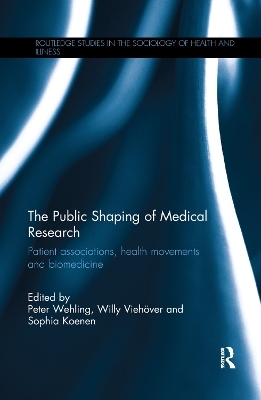
The Public Shaping of Medical Research
Routledge (Verlag)
978-0-367-34141-1 (ISBN)
Patient organizations and social health movements offer one of the most important and illuminating examples of civil society engagement and participation in scientific research and research politics. Influencing the research agenda, and initiating, funding and accelerating the development of diagnostic tools, effective therapies and appropriate health-care for their area of interest, they may champion alternative, sometimes controversial, programs or critique dominant medical paradigms. Some movements and organizations advocate for medical recognition of contested illnesses, as with fibromyalgia orADHD, while some attempt to "de-medicalize" others, such as obesity or autism.
Bringing together an international selection of leading scholars and representatives from patients' organizations, this comprehensive collection explores the interaction between civil society groups and biomedical science, technology development, and research politics. It takes stock of the key findings of the research conducted in the field over the past two decades and addresses emerging problems and future challenges concerning the interrelations between health movements and patient organisations on the one hand, and biomedical research and research policies on the other hand. Combining empirical case studies with conceptual discussion, the book discusses how public participation can contribute to, as well as restrict, the democratization of scientific knowledge production.
This volume is an important reference for academics and researchers with an interest in the sociology of health and illness, science and technology studies, the sociology of knowledge, medical ethics or healthcare management and research, as well as medical researchers and those involved with health-related civil society organizations.
Peter Wehling Peter Wehling currently is senior researcher at the Institute of Sociology at Goethe-University, Frankfurt/Main (Germany); until the end of 2013 he directed the research project "Participatory Governance of Science" at the University of Augsburg. His research interests include science and technology studies, sociology of knowledge and ignorance, sociology of health and illness, and sociological theory and critical sociology. Among his recent publications are: Entgrenzung der Medizin, co-edited with Willy Viehöver, Bielefeld 2011; Fighting a losing battle? The right not to know and the dynamics of biomedical knowledge production, in M. Gross and L. McGoey (eds) Routledge International Handbook of Ignorance Studies, London/New York, forthcoming Willy Viehöver Willy Viehöver is a senior researcher at the University of Augsburg (Germany) and currently visiting professor at the Department of Sociology. His main research interests include discourse and narrative analysis, qualitative social research, sociology of health and illness, policy analysis, science and technology studies, sociology of knowledge, and sociological theory. His recent publications include: Governing the Planetary Greenhouse in Spite of Scientific Uncertainty, which appeared in Science, Technology & Innovation Studies, 6(2), in 2010, and: Zivilgesellschaft und Wissenschaft – Ein Spannungsfeld zwischen Konflikt und Kooperation, co-authored with Peter Wehling, which appeared in Sozialwissenschaften und Berufspraxis (SuB), 35(2), in 2010 Sophia Koenen Sophia Koenen is currently working at the Department of Medical Sociology at the University of Regensburg as a researcher and teacher of undergraduate studies. She is involved in an interdisciplinary project on the public communication of genetic risk factors of widespread diseases, specifically Age Related Macular Degeneration (AMD). Until the end of 2013, Sophia Koenen was part of the research project "Participatory Governance of Science" at the Institute of Sociology at Augsburg University. She successfully earned her Master of Arts at the University of Augsburg in March 2014. Her scientific interest focuses on qualitative research in sociology of health and illness
Introduction: Patient Associations, Health Social Movements and the Public Shaping of Biomedical Research: An Introduction Part 1: Empirical Cases and Theoretical Perspectives 1. A Seat at the Table, "a Lab of Our Own" and Working with What We Know Now: How the U.S. Environmental Breast Cancer Movement Shapes Research 2. Initiating and Funding Medical Research on a Rare Disease: The Approach of the German Cystic Fibrosis Association 3. EURORDIS: Empowering Patients Living with Rare Diseases to Participate in Biomedical Knowledge Production 4. The Entanglement of Scientific and Political Claims: Towards a New Form of Patients’ Activism 5. Obesity, the Alternative Food Movement, and Complete Streets: New Forms of ‘Patient’ Activism and the Evolution of Health Social Movements Part 2: Shifting Contexts and New Challenges 6. Autism, the Internet and Medicalization 7. A Community Fractured: Canada’s Breast Cancer Movement, Pharmaceutical Company Funding, and Science-Related Advocacy 8. Beyond Scientific Controversies: Scientific Counterpublics, Countervailing Industries, and Undone Science 9. Interpellating Patients as Future Users of Biomedical Technologies: The Case of Patient Associations and Stem Cell Research 10. Patient Organizations as Biosocial Communities? Conceptual Clarifications and Critical Remarks Part 3: Democratizing Biomedicine? The Role of Patient Associations and Health Social Movements 11. Changing Contexts for Science and Society Interaction: From Deficit to Dialogue, from Dialogue to Participation- and beyond? 12. The Virtues (and Some Perils) of Activist Participation: The Political and Epistemic Legitimacy of Patient Activism 13. The Ethical Legitimacy of Patient Organizations’ Involvement in Politics and Knowledge Production: Epistemic Justice as a Conceptual Basis 14. Conclusion: Effects of and Challenges to the Public Shaping of Medical Research
| Erscheinungsdatum | 18.06.2019 |
|---|---|
| Reihe/Serie | Routledge Studies in the Sociology of Health and Illness |
| Zusatzinfo | 4 Tables, black and white; 3 Line drawings, black and white |
| Verlagsort | London |
| Sprache | englisch |
| Maße | 156 x 234 mm |
| Gewicht | 566 g |
| Themenwelt | Sachbuch/Ratgeber ► Gesundheit / Leben / Psychologie |
| Medizin / Pharmazie ► Medizinische Fachgebiete ► Medizinethik | |
| Pflege ► Studiengänge ► Pflegewissenschaft | |
| Studium ► 1. Studienabschnitt (Vorklinik) ► Med. Psychologie / Soziologie | |
| Studium ► Querschnittsbereiche ► Geschichte / Ethik der Medizin | |
| Studium ► Querschnittsbereiche ► Prävention / Gesundheitsförderung | |
| ISBN-10 | 0-367-34141-7 / 0367341417 |
| ISBN-13 | 978-0-367-34141-1 / 9780367341411 |
| Zustand | Neuware |
| Informationen gemäß Produktsicherheitsverordnung (GPSR) | |
| Haben Sie eine Frage zum Produkt? |
aus dem Bereich


